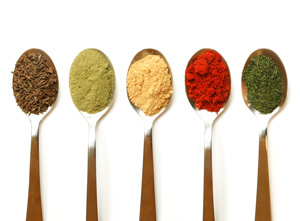 By Steven V. Joyal, MD, VP of Medical & Scientific Affairs at Life Extension.
By Steven V. Joyal, MD, VP of Medical & Scientific Affairs at Life Extension.
Spices add delicious flavors and tantalizing aromas to food, but many people don’t realize that spices offer a variety of beneficial, potentially lifesaving, health benefits. Consider your spice rack as a kind of natural medicine cabinet, and unleash amazing health benefits while you spice up your life with the following five spices!
Cinnamon: Derived from the bark of the tree bearing the same name, cinnamon is high in antioxidant activity. Clinical studies show beneficial changes in blood sugar control in patients with type 2 diabetes dosed with cinnamon spice from one to three grams daily. Experimental research suggests that cinnamon may reduce the likelihood that cells in the colon undergo cancerous changes. Essential oils of cinnamon have antimicrobial activity, too, and this helps provide a scientific basis for cinnamon’s traditional use as a natural treatment for diarrhea.
Cumin: A member of the parsley family, the spice cumin is derived from the plant’s dried seed. Scientific research shows that cumin can help regulate inflammation through nuclear factor-kappa B, a gene transcription factor linked with cancer, hardening of the arteries (arteriosclerosis), arthritis, and Alzheimer’s disease. Research suggests that cumin seed extract helps improve blood sugar control, reduce oxidative stress, and inhibit the formation of advanced glycation end products, also known as AGEs. One experimental study suggests that the equivalent of between two and three grams of cumin seed extract can help improve hemoglobin A1c, a measurement of blood sugar control.
Ginger: This versatile spice is derived from the root of the plant, and a variety of amazing phytochemicals have been isolated from ginger and found to possess antibacterial, anti-inflammatory, fever-reducing, and pain-relieving properties. Traditional Indian Ayurvedic medicine utilizes ginger root as a digestive aid for young infants with colic and for adults with indigestion. Ginger is a natural remedy for nausea and vomiting due to seasickness and morning sickness of pregnancy. For example, a recent study involving morning sickness of pregnancy found that one gram of ginger taken by mouth significantly reduced the frequency and severity of nausea episodes. Be aware that if you take the drug warfarin, a well-known blood thinner, there is the potential for interaction with ginger, so avoid ingesting large amounts of ginger while taking warfarin.
Turmeric: Curries and other South Asian and Middle Eastern delicacies typically include the spice turmeric. The active ingredient in turmeric is curcumin, and scientific support involving curcumin includes anti-cancer and anti-inflammatory properties. Some studies suggest that curcumin may help reduce the build-up of brain beta-amyloid plaque in Alzheimer’s disease.
Rosemary: The leaves of the herb rosemary are used fresh as well as dried in traditional Mediterranean dishes to impart amazing, fragrant aromas of evergreen. Rosemary has strong anti-oxidant properties, and exciting preliminary research suggests that rosemary’s relatively high level of carnosic acid may help reduce the risk of Alzhemier’s disease and stroke. Furthermore, new research suggests that rosemary extract rich in carnosic acid may help inhibit human malignant melanoma cell growth and reduce inflammation in experimental models of arthritis. Four to six grams of ground, fresh rosemary leaves is a typical therapeutic dose.
Also Read:
